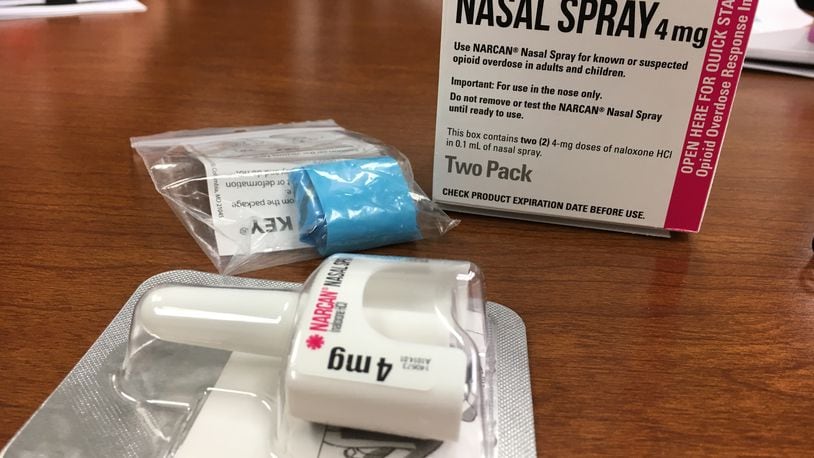“This is a piece of the opioid overdose deaths going down,” said Jodi Long, director of treatment and supportive services for Montgomery County Alcohol, Drug Addiction & Mental Health Services.
An advisory issued by Surgeon General Jerome Adams last week said naloxone — known by the brand name Narcan — can save lives of a broad category of people: from those misusing the drugs on the street to those taking high doses of prescription painkillers to community members “who come into contact with people at risk for opioid overdose.”
“Knowing how to use naloxone and keeping it within reach can save a life,” Adams said, and cited research that shows overdose deaths decrease when naloxone and overdose education are available to the public.
“Therefore, increasing the availability and targeted distribution of naloxone is a critical component of our efforts to reduce opioid-related overdose deaths and, when combined with the availability of effective treatment, to ending the opioid epidemic,” Adams’ statement said.
RELATED: What solutions are making a difference in Ohio’s drug epidemic?
Long said she’d like to see every household where someone has a prescription for an opioid also have a naloxone kit on hand. The elderly are at increased risk of accidentally taking too many pills and suffering overdose symptoms, she said.
Naloxone has its naysayers, including those who argue that making the overdose antidote widely available encourages drug abuse and risk-taking on the part of users.
Butler County Sheriff Richard Jones gained national attention last summer when he told television jounalist Ashleigh Banfield of HLN that he did not intend to have his deputies carry naloxone.
"Basically, we're not going to use Narcan," he said.
Local health officials said they’ve seen their fatalities drop since naloxone became widely used.
RELATED: Hundreds of drug deaths in 2017 ‘a lot less’ than expected
In Clark County 438 naloxone kits have been distributed since 2016 to people who attended free training through Project DAWN, a statewide initiative through which counties can conduct free naloxone training and distribute free nasal spray doses of the drug. DAWN stands for Deaths Avoided with Naloxone.
When administered during an overdose, naloxone blocks the effects of opioids on the brain and quickly restores breathing. Naloxone has been used by emergency medical professionals for more than 40 years, but became much more widespread in the last couple of years as the opioid epidemic took hold.
Clark County program coordinator Kelly Vinegar said at least 33 lives have been saved by training more people on how to use the opioid blocker.
“The number of lives saved is evidence that this is effective,” she said.
RELATED: Your questions answered about the opioid epidemic
The county had a record 104 drug overdose deaths last year, but the second half of 2017 saw a slow down that has continued into 2018. Through March 14, the Clark County coroner’s office had handled just seven suspected overdose fatalities.
Montgomery County officials have noted the same decrease in deaths and attribute it in part to the availability of naloxone.
Through Project DAWN, Montgomery County ADAMHS distributed 3,303 naloxone kits in 2017. They reported 248 people came back to get refills, meaning they’d used the doses to revive someone.
Montgomery County had 62 suspected overdose deaths in the first three months of this year, down from 185 during the same period last year.
In Butler County, the health department distributed 283 doses of naloxone through Project DAWN in 2017 and 43 doses so far this year.
The fact that people have to attend a 45-minute training may be a deterrent, said Butler County Health Commissioner Jenny Bailer.
“We can’t just pass out the kits,” she said. “There isn’t a lot of interest from the public (to attend the training).”
HOW TO GET HELP: A local opioid addiction resource guide
The department is going to try and do more free training outside of its office this year to bring the kits to the public, she said.
A grant will allow 450 kits provided by the Ohio Department of Health to be distributed through quick response teams following up with recent overdose survivors and through reentry specialists that work with recent jail releases in Butler County, according to Tiffany Lombardo, director of alcohol and drug addiction services.
Anyone interested in having naloxone on hand can also get a prescription from their doctor, with insurance covering the cost, or it can be purchased at local pharmacies with no prescription needed, but at an out-of-pocket cost.
How to get free naloxone training:
Montogmery County Project DAWN: Free classes and naloxone kits are available on Wednesdays at noon at Samariatan Behavioral Health, 601 S. Edwin C. Moses Blvd. Training for groups of 10 or more may be scheduled. 937-224-4646. The Life Enrichment Center, 425 N. Findlay St., is offering free classes every Tuesday at 10 a.m.
Project Dawn Miami County: 937-573-3500
McKinley Hall, Springfield: 937-328-5300
Clark County Families of Addicts support group is scheduled to meet from 6:30 to 8 p.m. Tuesday, April 10, at the community room in Mulberry Terrace Apartments, 120 W. Mulberry St. This week the group will have naloxone training along with free kits.
Project Dawn offers free training by appointment every Tuesday and Thursday at 1 p.m. at the Butler County Health Department. Call 513-863-1770 to set up an appointment.
About the Author
